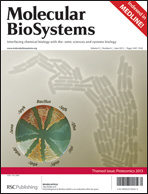A proteomics approach to study the molecular basis of enhanced salt tolerance in barley (Hordeum vulgare L.) conferred by the root mutualistic fungus Piriformospora indica†
Abstract
Piriformospora indica is a root-interacting mutualistic fungus capable of enhancing plant growth, increasing plant resistance to a wide variety of pathogens, and improving plant stress tolerance under extreme environmental conditions. Understanding the molecular mechanisms by which P. indica can improve plant tolerance to stresses will pave the way to identifying the major mechanisms underlying plant adaptability to environmental stresses. We conducted greenhouse experiments at three different salt levels (0, 100 and 300 mM NaCl) on barley (Hordeum vulgare L.) cultivar “Pallas” inoculated with P. indica. Based on the analysis of variance, P. indica had a significant impact on the barley growth and shoot biomass under normal and salt stress conditions. P. indica modulated ion accumulation in colonized plants by increasing the foliar potassium (K+)/sodium (Na+) ratio, as it is considered a reliable


 Please wait while we load your content...
Please wait while we load your content...